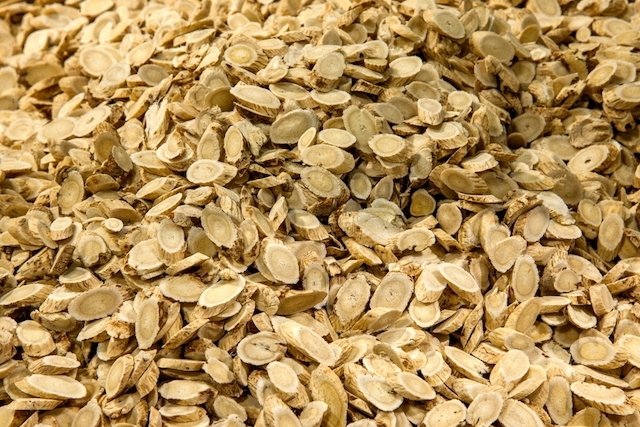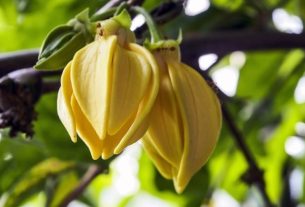Astragalus is a medicinal plant that is widely used to strengthen the immune system, due to the presence of saponins, it helps reduce the risk of various diseases, such as colds, cardiovascular problems and even cancer. Furthermore, this plant can also be used to improve feelings of lack of energy, reduce tiredness and combat stress and high cholesterol.
The normally used part of astragalus is its dried root, from which active substances with medicinal properties are extracted, for the preparation of teas or in the form of tinctures, capsules or creams, for example.
Astragalus can be purchased in health food stores and some supermarkets, and should be used with medical advice or from a professional with experience in medicinal plants.

What is it for
Using astragalus may have several proven health benefits, such as:
- Strengthen the immune system: contains substances capable of controlling immune system cells to function more effectively;
- Decrease inflammationsuch as arthritis and heart disease: due to its composition of saponins and polysaccharides, this plant reduces inflammation and even helps in the healing of various types of injuries;
- Prevent cardiovascular diseasessuch as high blood pressure or heart attack: as it is very rich in antioxidants, astragalus prevents the accumulation of fatty plaques in the arteries;
- Reduce the risk of cancer: due to its antioxidant action and the fact that it stimulates the immune system;
- Control blood sugar: decreases insulin resistance, allowing sugar to be used by the body without accumulating in the blood;
- Reduce high cholesterol: with its antioxidant action it prevents the accumulation of cholesterol in the body;
- Treating flu and colds: when combined with ginseng or echinacea, it has a powerful antiviral action that is capable of eliminating the viruses responsible for these diseases;
- Alleviate the side effects of chemotherapy: has been used to relieve effects such as nausea, vomiting and diarrhea.
Furthermore, this plant is also used in Chinese medicine to treat other problems such as herpes, HIV, eczema and even to eliminate fluid accumulation. However, these effects have not been scientifically proven.
Although it has many health benefits, astragalus should be used under the guidance of a doctor or herbalist, and does not replace conventional medical treatment.
How to use
To obtain the benefits of astragalus, the recommended dose is 500 mg, divided into two daily doses of 250 mg and, therefore, the most reliable way is to use capsules. However, it must be adapted to each person, according to their weight and the problem to be treated and, therefore, it is important to consult a doctor or a specialist in traditional Chinese medicine, for example.
Possible side effects
Side effects of this medicinal plant are very rare, especially when used within recommended dosages, however, in some cases, stomach pain, diarrhea or easier bleeding may occur.
Who shouldn’t use
Astragalus is contraindicated in people with hypersensitivity to this medicinal plant. Furthermore, it should only be used under medical advice in people with autoimmune diseases, such as multiple sclerosis or rheumatoid arthritis, and should be avoided by pregnant or breastfeeding women. See other medicinal plants that should be avoided during pregnancy and which ones can be used.
The use of this plant can also alter the effect of some medications such as cyclophosphamide, lithium and immunosuppressive medications.
Bibliography
- ABD ELRAHIM ABD ELKADER, HT; et al. Astragalus species: Phytochemistry, biological actions and molecular mechanisms underlying their potential neuroprotective effects on neurological diseases. Phytochemistry. 113293, 2022
- FU, J.; et al. Review of the botanical characteristics, phytochemistry, and pharmacology of Astragalus membranaceus (Huangqi). Phytother Res. 28. 9; 1275-83, 2014
- SHEIK, A.; et al. The anti-cancerous activity of adaptogenic herb Astragalus membranaceus. Phytomedicine. 91. 153698, 2021
- ZHANG, Z.; et al. Effect of Astragalus polysaccharide in treatment of diabetes mellitus: a narrative review. J Tradit Chin Med. 39. 1; 133-138, 2019
- CHAVES, António J. Leal. Live Better with Medicinal Plants. 7. Lisbon, Portugal: Edições UNE, 2008. 84.
- WANG, Jia et. al.. Extraction, Structure, and Pharmacological Activities of Astragalus Polysaccharides. Appl. Sci. 122. 9; 2019

Sign up for our newsletter and stay up to date with exclusive news
that can transform your routine!
Warning: Undefined array key "title" in /home/storelat/public_html/wp-content/plugins/link-whisper-premium/templates/frontend/related-posts.php on line 12
Warning: Undefined array key "title_tag" in /home/storelat/public_html/wp-content/plugins/link-whisper-premium/templates/frontend/related-posts.php on line 13



